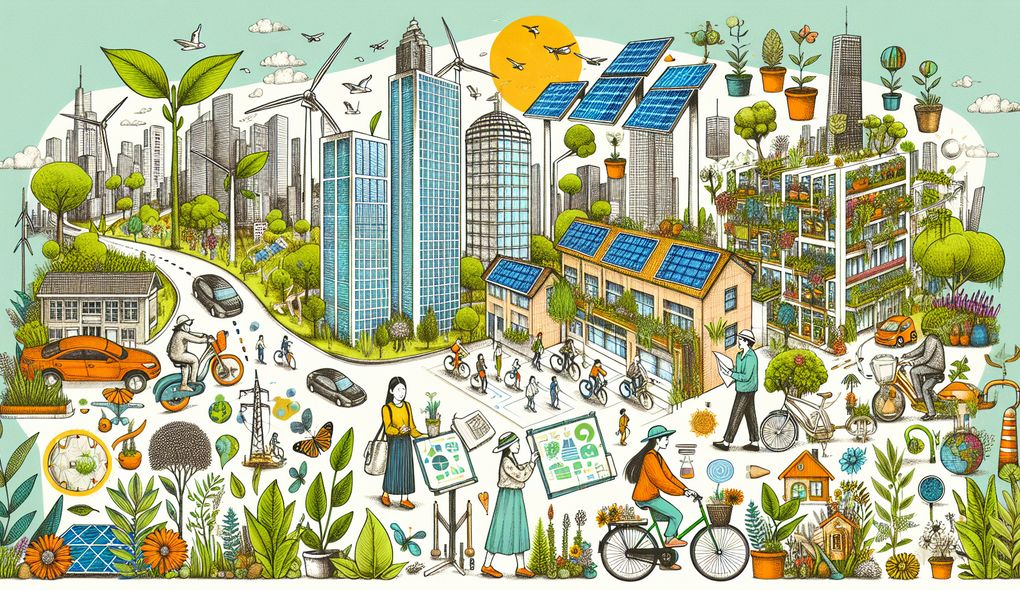What sustainable design principles and practices are you familiar with?
SENIOR LEVEL

Sample answer to the question:
I am familiar with several sustainable design principles and practices. For example, I have experience in using sustainable design software and tools to analyze and optimize building performance. I also have a strong understanding of life-cycle assessments and environmental impact assessments, which help me identify areas for improvement in terms of resource efficiency and environmental impact. In addition, I have worked on projects where I have incorporated renewable energies and eco-friendly materials into the design to reduce the ecological footprint. I am also up to date with the latest sustainability trends, technologies, and regulations, which allows me to stay ahead in the field of sustainable design.
Here is a more solid answer:
As a sustainable design specialist, I have comprehensive knowledge and experience in various sustainable design principles and practices. I am well-versed in using tools like EnergyPlus and Green Building Studio to conduct energy simulations and optimize building performance. In my previous roles, I have conducted detailed life-cycle assessments and environmental impact assessments to identify areas for improvement in terms of resource efficiency and environmental impact. For example, in a recent project, I analyzed the materials used in the construction process to minimize waste and enhance recyclability. I have also led the integration of renewable energies, such as solar panels and geothermal systems, into design projects to reduce reliance on non-renewable resources. Furthermore, I stay updated on the latest sustainability trends, technologies, and regulations by attending conferences and participating in professional development courses. This allows me to bring innovative and eco-friendly solutions to the projects I work on.
Why is this a more solid answer?
The solid answer expands on the candidate's familiarity with sustainable design principles and practices by providing specific details and examples. It highlights their experience with using energy simulation tools, conducting life-cycle assessments and environmental impact assessments, integrating renewable energies into design projects, and staying updated with sustainability trends. However, it could further improve by discussing their experience with collaborating in multidisciplinary teams and educating clients on sustainable design practices.
An example of a exceptional answer:
I have extensive experience and expertise in sustainable design principles and practices. In my role as a sustainable design specialist, I have successfully led and implemented innovative sustainable design strategies for various projects. For instance, I collaborated with architects, engineers, and contractors to develop net-zero energy buildings that produce as much energy as they consume. This involved the integration of passive design strategies, energy-efficient systems, and renewable energy technologies. I have also conducted comprehensive environmental impact assessments and life-cycle analyses to evaluate the sustainability performance of projects. In one project, I identified opportunities to reduce water consumption by implementing rainwater harvesting systems and graywater recycling. Additionally, I have actively participated in industry conferences and workshops to stay abreast of the latest sustainability trends and regulations. This continuous learning allows me to apply cutting-edge solutions and best practices in my work. Overall, my expertise in sustainable design principles and practices enables me to create environmentally conscious, resource-efficient, and sustainable solutions for any design project.
Why is this an exceptional answer?
The exceptional answer showcases the candidate's extensive experience and expertise in sustainable design principles and practices. It highlights their successful implementation of innovative sustainable design strategies, collaboration with multidisciplinary teams, integration of net-zero energy concepts, and conducting comprehensive assessments. It also emphasizes their commitment to continuous learning and staying updated with the latest sustainability trends and regulations. The answer effectively demonstrates the candidate's ability to create environmentally conscious and sustainable solutions. However, it could be further improved by providing specific examples of projects where the candidate has educated and advised clients on sustainable design practices.
How to prepare for this question:
- 1. Familiarize yourself with sustainable design software and tools such as EnergyPlus and Green Building Studio. Understand how to use them to optimize building performance and conduct energy simulations.
- 2. Research and stay updated on sustainable design principles, practices, technologies, and regulations. Attend industry conferences, workshops, and webinars to enhance your knowledge.
- 3. Gain practical experience in conducting life-cycle assessments and environmental impact assessments. Understand how to identify areas for improvement in terms of resource efficiency and environmental impact.
- 4. Develop a portfolio of sustainable design projects that showcase your expertise in integrating renewable energies, reducing ecological footprints, and implementing innovative strategies.
- 5. Practice discussing your sustainable design experience, including specific examples, during mock interviews or with a mentor. Focus on highlighting your leadership, collaboration, and communication skills in addition to technical knowledge.
What are interviewers evaluating with this question?
- Sustainable design principles and practices

